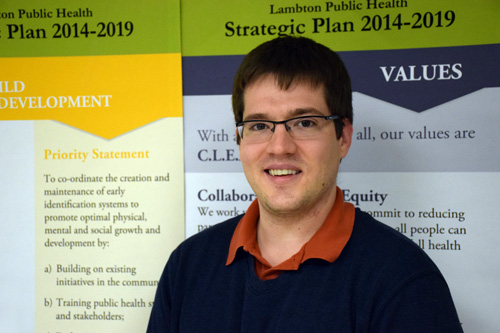Matt Joosse grew up attending College Royal and hearing about the University of Guelph from his parents, who are both graduates. His father, a veterinarian, sometimes took him on farm calls.
“I remember sitting on the fence watching my dad untwist a Holstein’s stomach,” says Joosse. “It was the coolest thing I had ever seen.”
But Joosse knew veterinary medicine wasn’t for him. Instead, he was more interested in understanding the way the living world functions, which led him to the biological sciences program at U of G.
Starting in high school, Joosse also became involved in another aspect of health: donating blood. He made his first blood donation at 17, and was recognized for making 25 donations before he turned 25 (to date he’s donated almost 70 times). While earning his B.Sc. in Biological Sciences and Masters in Public Health (MPH), he became a lead volunteer at both the on-campus blood donor clinics and the permanent donation location in Guelph. His commitment earned him awards, first for regional volunteer of the year, and later for volunteer of the year in Southern Ontario from the Canadian Blood Services (CBS). It also led to a summer job with the CBS doing some research on blood transfusions, and a desire to enter the MPH program.
“Dr. Andrew Papadopoulos was also a major influence in my decision – within a few minutes of talking to him about the program, I knew it was the right fit for me,” Joosse says.
Shortly after graduation, he was hired by Lambton Public Health as a health promoter, with a focus on dental health.
“I knew very little about how dental programs worked in Ontario when I was hired, so there was a huge learning curve at first,” he says. Joosse is responsible for locating and analyzing research, and translating it into easy-to-understand language for the decision-makers involved – skills he says he learned during his MPH courses.
Community water fluoridation is one important focus of Joosse’s work.
“There are more than 70 years of compelling and accurate scientific support for this approach to improving dental health, but there are some very vocal people who are opposed to it,” he says. “A large part of a health promoter’s job is turning complex issues into something manageable, to help decision-makers such as local politicians understand what the research is telling us.”
As well as working on this issue locally, Joosse is helping to create a toolkit of resources for other Canadian communities to use when promoting community water fluoridation.
“The MPH program gave me such a strong foundation for my work as a health promoter,” Joosse says. “The One Health approach that is taught in Guelph shows how the environment, animals and humans all interact, and that just makes sense in terms of understanding health. We are all connected.”
